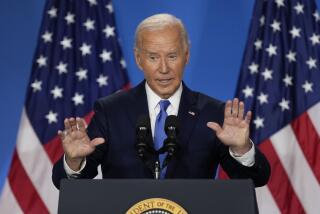Biden passes his ‘Obamacare’ quiz
- Share via
Vice President Joe Biden can’t delve into the minutiae of domestic policy the way Rep. Paul Ryan (R-Wis.), the Republican he’s facing in November, can. Yet Biden can still hold his own, as he demonstrated during a visit to Nestor’s Gourmet Deli in Boca Raton, Fla., on Friday for an impromptu bit of glad-handing and grub-grabbing. Biden nailed the key features of the insurance marketplaces created by the 2010 healthcare law when quizzed by a patron, although he couldn’t stop himself from going overboard on the law’s potential to lower premiums.
My colleague Mike Memoli, who was accompanying Biden, reports that a man identifying himself as Steve Grossman, a 39-year-old working in the financial services industry, asked Biden if he could sit with him and ask some questions. Grossman said that he spends about $13,000 on healthcare for his family, then asked the vice president to explain how the “Obamacare program” would help him.
After determining that Grossman earned more than $125,000 a year -- well above the cutoff for federal subsidies -- Biden went on to say that Grossman would still benefit from the insurance-buying “exchanges” that the law calls for each state to set up by 2014. By gathering all the state’s consumers shopping for individual policies into one pool, the exchanges will give them the same sort of negotiating clout with insurers that large group plans enjoy, Biden said.
PHOTOS: Joe Biden wants to hug ... everyone!
Or, as the vice president not-so-elegantly put it, “[Y]ou have much more bargaining power in the exchange. So the exchange says [to insurers], ‘We’re not going to pay more than a penny for this. We’re not going to pay a penny and a quarter.’ [If insurers] say to you, ‘You’re paying a penny and quarter’ ... where you gonna go? You’re out there by yourself; you have no bargaining power. That’s the fundamental thing that will change for you.”
Biden also noted that the plans offered in the exchanges will have to comply with new federal rules that require coverage of preexisting conditions and bar lifetime limits on benefits.
Grossman pressed Biden to quantify how much the savings would be, and at first the vice president demurred. “There’s been all kinds of estimates that, what it will save,” Biden said. “The best way to look at it is if you could find a company that had a similar number of employees, what they’re paying for the coverage is what you’d pay for it. it’s hard to make a generalization; it depends on the size of the exchange, how many people are competing, how many companies compete.”
COMMENTARY AND ANALYSIS: Obama vs. Romney
That’s an effective distillation of the often-misunderstood value of the new exchanges. If only Biden had stopped there.
Instead, after Grossman asked again if the measure would “decrease cost” while improving benefits, Biden responded, “Well, yes, because you can get more benefits for less money. So let’s say that you had a low-benefit plan now that was a high cost. You wanted to keep the same low-benefit plan again, well then you can get that same plan for considerably less cost. if you have a low-benefit plan now at a high cost and you said now what you want is a very high-benefit plan, the cost will still go down but not as much as if you kept the same low-benefit plan. So it’s choice; you get to choose among those insurance companies that are competing as part of the exchanges.”
Predicting the future price of healthcare insurance is about as wise politically as predicting how much a stimulus bill will bring down the unemployment rate. It’s a safe bet that insurers will offer better deals to shoppers in the exchanges than they would if the exchanges didn’t exist. But how those deals compare to the premiums people pay in today’s market depends on many factors. Biden noted a few of them. Another is whether the exchange takes the role of an active buyer, negotiating deals on behalf of consumers, or if it simply acts as a clearinghouse, letting insurers offer policies that comply with the new rules regardless of the rates charged. California is going the active-buyer route, but other states may not in the face of strong opposition from insurers.
INTERACTIVE: Battleground states
In addition, the first year may be particularly dicey for insurers to price their products, considering that the pool will have a new and hard-to-predict membership. If the insurance mandate in the law is effective, each state’s pool should be large and rich in younger, healthier consumers -- in other words, the buyers will be less expensive to insure, on average, than today’s customers in the individual market. If the mandate isn’t effective, there will be no such influx of the young and healthy, and no corresponding reduction in risk (or cost).
I think it’s still likely that Florida’s exchange will offer individual buyers a better deal than they get today, in part because healthcare costs haven’t been increasing as rapidly during the downturn as they were before. But if I were Biden, I’d hedge my bets.
(Hat tip to Carrie Dann of NBC for transcribing Biden’s exchange with Grossman.)
ALSO:
Wait for it -- Romney’s media rebound
Follow Jon Healey on Twitter @jcahealey
More to Read
A cure for the common opinion
Get thought-provoking perspectives with our weekly newsletter.
You may occasionally receive promotional content from the Los Angeles Times.











